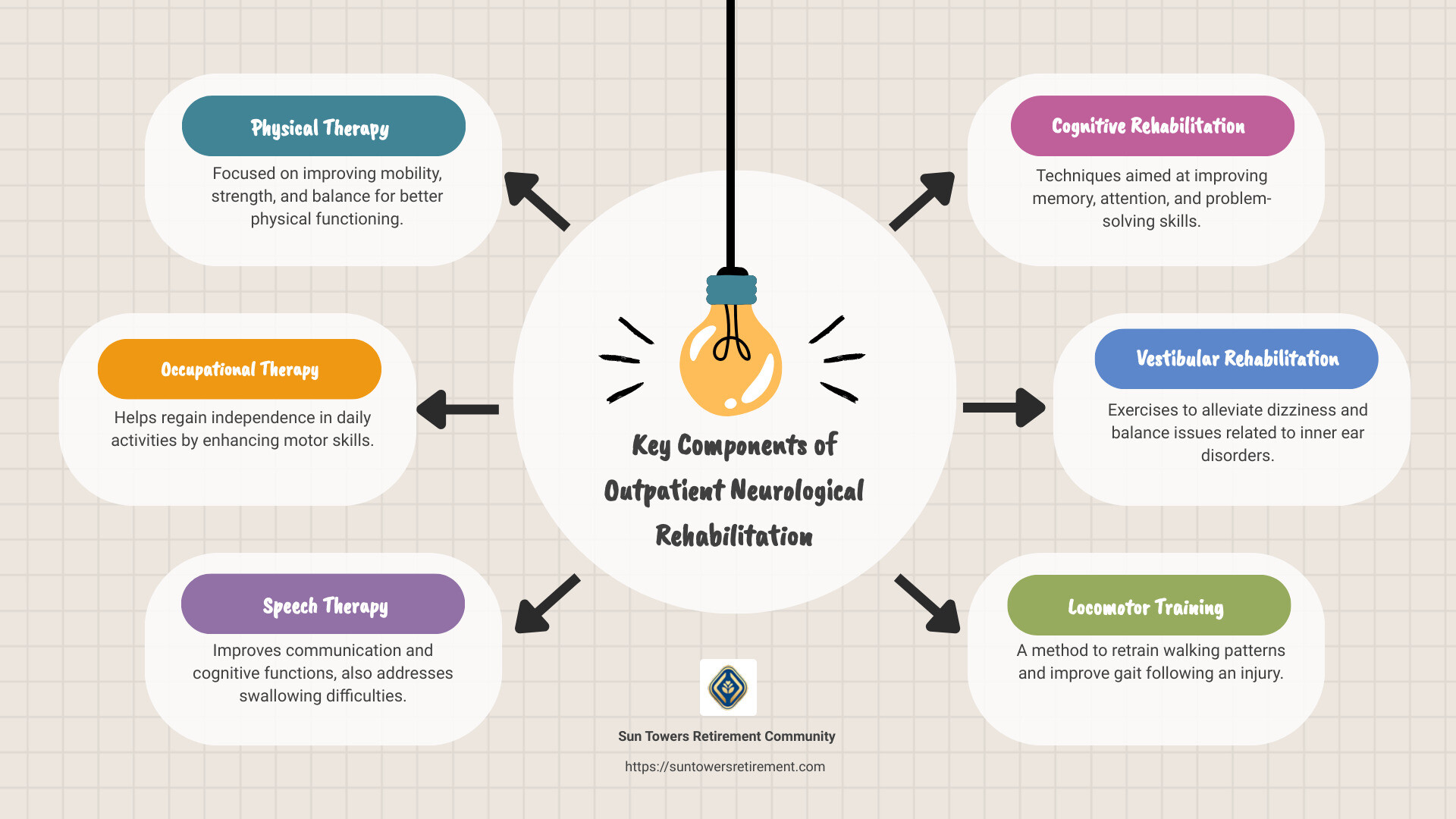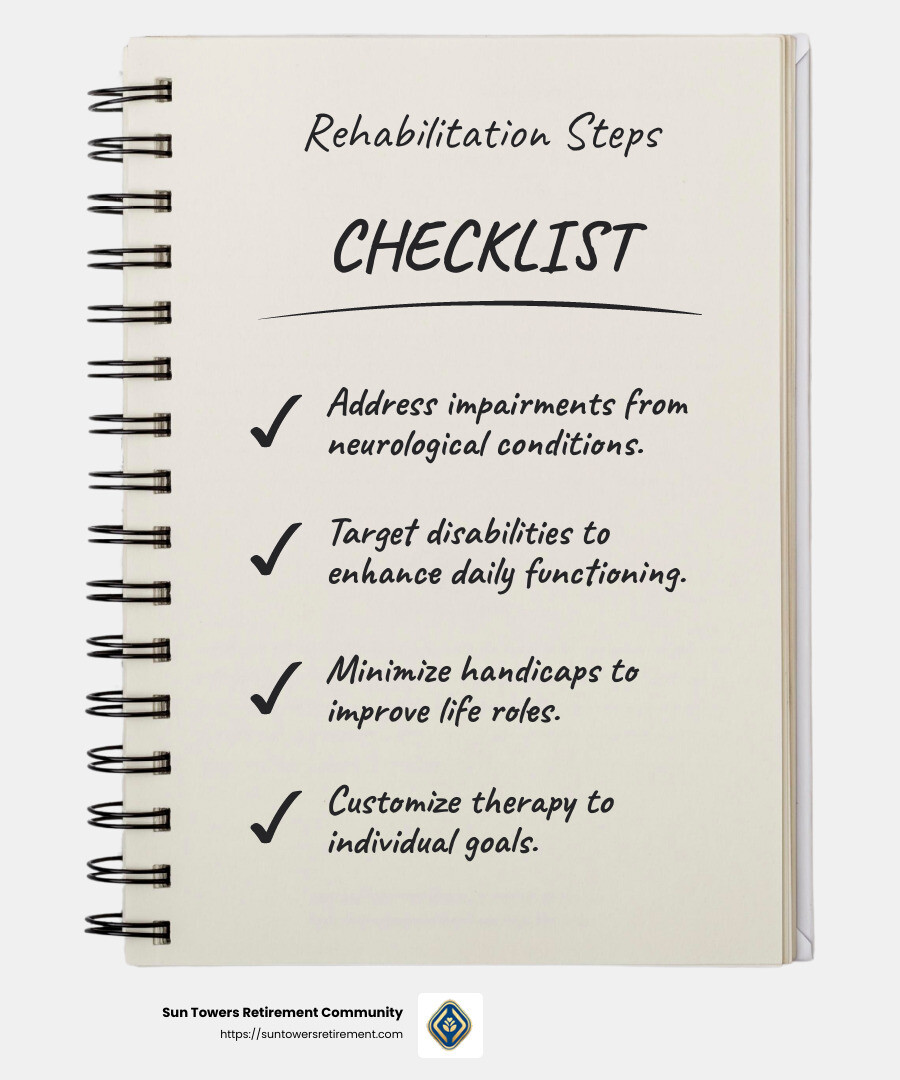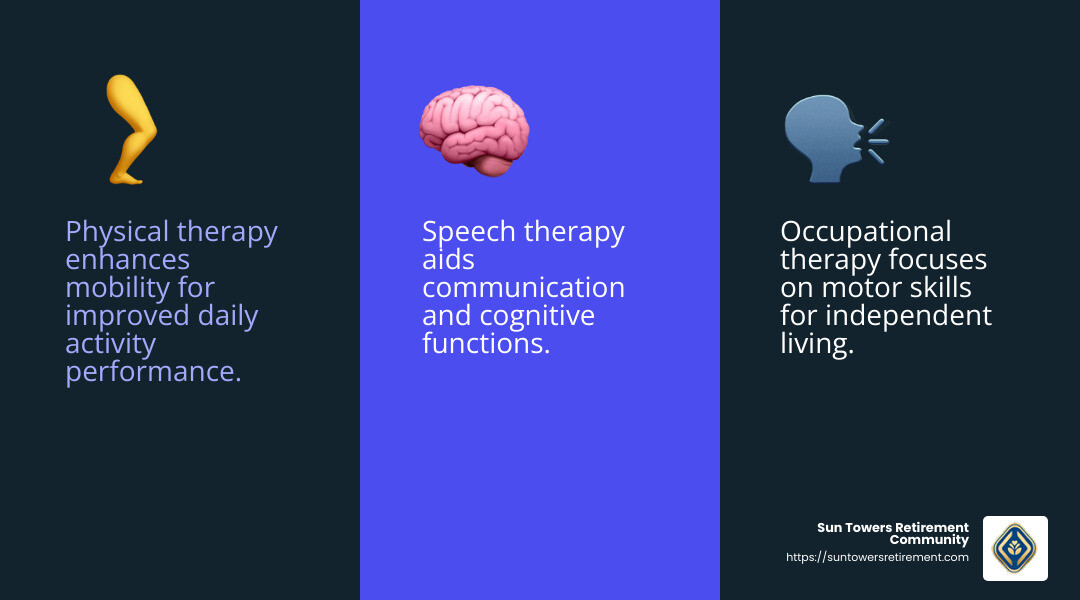Outpatient Neurological Rehabilitation: Top 5 Proven Paths
Outpatient neurological rehabilitation is pivotal for those navigating life with a nervous system injury or a progressive neurological disease. It bolsters recovery by providing specialized care designed to improve daily functioning and improve quality of life. This service is a guide of hope for many, offering a structured yet flexible approach to rehabilitation outside of a hospital setting.
In this field of care, individuals benefit from therapy focused on specific needs—be it strengthening muscles, improving language and cognitive functions, or regaining independence in everyday activities. Patients are met with compassion and innovation as dedicated professionals craft personalized treatment plans.
Outpatient services ensure that neurological rehabilitation is accessible and accommodating, allowing patients to receive extensive therapy while maintaining their routine and independence. This can involve multiple therapy types like physical, occupational, and speech therapy, each playing a crucial role in the holistic recovery journey.
Outpatient neurological rehabilitation terms simplified:
– how much does medicare pay for physical therapy per visit
– occupational therapy cost after insurance accepted
Understanding Outpatient Neurological Rehabilitation
Outpatient neurological rehabilitation is a comprehensive program aimed at addressing the challenges faced by individuals with neurological conditions. These challenges are often categorized into three main areas: impairment, disability, and handicap.
Impairment refers to any loss or abnormality of psychological, physiological, or anatomical structure or function. For example, after a stroke, a person might experience weakness in one arm or difficulty speaking. These impairments are the direct result of the neurological condition and are the primary focus in the initial stages of rehabilitation.
Disability is the restriction or lack of ability to perform an activity in the manner or within the range considered normal for a human being. A person with impaired balance may struggle to walk independently, which is classified as a disability. Outpatient rehabilitation aims to reduce these disabilities through targeted therapies that improve mobility, strength, and coordination.
Handicap is the disadvantage that results from an impairment or disability that limits or prevents the fulfillment of a role that is normal for that individual. This could mean difficulty returning to work or participating in social activities. Rehabilitation not only addresses physical and cognitive impairments but also focuses on reducing the handicaps by improving the individual’s ability to engage in daily life and social roles.
Outpatient neurological rehabilitation is custom to each individual’s needs, ensuring that therapy aligns with their personal goals and life circumstances. By understanding impairment, disability, and handicap, therapists can create effective treatment plans that promote recovery and improve quality of life.
As we dig deeper into the components of outpatient neurological rehabilitation, we will explore how different therapies contribute to overcoming these challenges and support individuals on their path to recovery.
Key Components of Outpatient Neurological Rehabilitation
In outpatient neurological rehabilitation, three main therapies play crucial roles: physical therapy, occupational therapy, and speech therapy. Each therapy targets different aspects of recovery, helping individuals regain their abilities and independence.
Physical Therapy
Physical therapy focuses on enhancing mobility, strength, and balance. These are essential for patients recovering from neurological conditions like strokes or spinal cord injuries. Physical therapists use evidence-based techniques to help patients regain natural movement patterns and improve their ability to perform daily activities.
-
Mobility: Therapists work on exercises and activities that help improve walking and movement, ensuring patients can steer their environments safely.
-
Strength: Building muscle strength is vital for supporting the body and performing tasks with ease. Physical therapy includes strength training custom to each patient’s needs.
-
Balance: Balance exercises help prevent falls and ensure patients can move confidently in various settings.
Occupational Therapy
Occupational therapy is about helping individuals perform daily activities independently. It focuses on motor skills and the ability to handle everyday tasks. This therapy is crucial for those with conditions affecting their fine motor skills or cognitive functions.
-
Daily Activities: Occupational therapists assist with tasks such as dressing, cooking, and grooming. They aim to restore the patient’s ability to manage these activities independently.
-
Independence: The goal is to enable patients to live as independently as possible, whether at home or in the community.
-
Motor Skills: Therapists work on improving coordination and strength in the hands and arms, which are essential for many daily tasks.
Speech Therapy
Speech therapy addresses communication, swallowing, and cognitive functions. This therapy is vital for individuals with speech impairments due to neurological conditions.
-
Communication: Speech therapists help patients improve their ability to express themselves and understand others, which is crucial for social interactions and daily communication.
-
Swallowing: Many neurological conditions affect swallowing, leading to difficulties in eating and drinking. Speech therapy includes exercises and strategies to improve swallowing safety and efficiency.
-
Cognitive Functions: Therapists also work on cognitive skills such as memory, attention, and problem-solving, which are often impacted by neurological conditions.
Each of these therapies is custom to the individual’s needs, ensuring a comprehensive approach to recovery. By focusing on these key components, outpatient neurological rehabilitation supports patients in regaining their independence and improving their quality of life.
In the next section, we will explore specialized programs and techniques that improve the effectiveness of these therapies.
Specialized Programs and Techniques
In outpatient neurological rehabilitation, specialized programs and techniques are designed to address specific challenges and improve the recovery process. Let’s take a closer look at some of these innovative approaches: cognitive rehabilitation, vestibular rehabilitation, and locomotor training.
Cognitive Rehabilitation
Cognitive rehabilitation focuses on improving mental functions that may be affected by neurological conditions. This can include memory, attention, and problem-solving skills.
-
Memory and Attention: Therapists use exercises and strategies to help patients improve their memory recall and concentration. For example, creating visual images or using calendars can aid in memory improvement.
-
Problem-Solving: Patients engage in activities that challenge their thinking skills, helping them steer daily situations more effectively.
This type of rehabilitation is crucial for individuals whose cognitive functions have been impacted, allowing them to regain independence and confidence in their everyday lives.
Vestibular Rehabilitation
Vestibular rehabilitation is aimed at individuals experiencing balance issues, often due to inner ear problems or neurological conditions.
-
Balance Training: Exercises are custom to help patients improve their balance, reduce dizziness, and improve their overall stability.
-
Coordination: Therapists focus on exercises that help patients coordinate their movements better, ensuring safer mobility.
Through vestibular rehabilitation, patients can regain their ability to move confidently and safely in their environments, reducing the risk of falls and improving their quality of life.
Locomotor Training
Locomotor training is a specialized technique designed to help patients relearn walking abilities, often using advanced equipment like body-weight-supported treadmills.
-
Body-Weight Support: This technique reduces the weight placed on the legs, allowing patients to practice walking with less strain.
-
Treadmill Training: Patients engage in treadmill exercises that mimic natural walking patterns, helping them regain the ability to walk independently.
Locomotor training is particularly beneficial for patients recovering from strokes or spinal cord injuries, as it focuses on restoring natural movement patterns and improving mobility.
These specialized programs and techniques are integral to the comprehensive approach of outpatient neurological rehabilitation, offering custom solutions to meet the unique needs of each patient. By incorporating these innovations, patients have a better chance of achieving their highest potential in recovery.
In the next section, we will address some frequently asked questions about outpatient neurological rehabilitation, providing clarity and insight into this important field.
Frequently Asked Questions about Outpatient Neurological Rehabilitation
What is done in neuro rehabilitation?
Neuro rehabilitation is a comprehensive program designed to help individuals recover from neurological conditions. It focuses on improving daily functions and quality of life.
-
Activities of Daily Living (ADLs): Patients learn to perform essential tasks like dressing, bathing, and cooking. Occupational therapists work with them to regain independence in these activities.
-
Speech Therapy: This involves exercises to improve communication skills and address swallowing difficulties. Therapists help improve language comprehension, articulation, and cognitive functions.
-
Stress Management: Managing stress is crucial for recovery. Techniques include relaxation exercises and counseling to help patients cope with the emotional impact of their condition.
What is the difference between level 1 and level 2 neuro rehab?
Neuro rehabilitation is often divided into different levels based on the complexity of care required.
-
Level 1 Neuro Rehab: This is typically more intensive and is offered in specialized centers. It involves tertiary services, which provide advanced care for severe or complex neurological conditions.
-
Level 2 Neuro Rehab: This level is more localized and involves specialist services available in community settings. It focuses on less severe cases and helps patients transition back to daily life.
What are the three basic principles of neurorehabilitation?
Neurorehabilitation is guided by three core principles to ensure effective recovery:
-
Impairment: This refers to the loss of function in a specific body part or system. Rehabilitation aims to reduce these impairments through targeted therapies.
-
Disability: A disability is a limitation in performing tasks or activities. The goal of rehab is to help patients overcome these limitations and regain independence.
-
Handicap: This is the disadvantage experienced in social roles and activities due to an impairment or disability. Rehabilitation efforts focus on reducing these disadvantages and enhancing the patient’s participation in society.
By understanding these principles, patients and their families can better appreciate the goals and processes involved in outpatient neurological rehabilitation. This knowledge empowers them to actively engage in their recovery journey.
Conclusion
At Sun Towers Retirement Community, we believe in providing holistic care that supports every aspect of our residents’ well-being. Our approach to care ensures that residents can age with dignity, comfort, and a sense of community. We offer a unique continuum of care that allows individuals to transition seamlessly between different levels of support as their needs change.
Our outpatient neurological rehabilitation services are an integral part of this continuum. We focus on enhancing mobility, independence, and communication skills to improve quality of life. By offering a range of therapies, from physical and occupational to speech therapy, we tailor our programs to meet the unique needs of each resident.
Residents at Sun Towers benefit from a supportive environment that encourages participation in daily activities and social events. This not only aids in recovery but also promotes a sense of belonging and purpose. Our commitment to excellence means that we are always looking for innovative ways to improve the care we provide.
If you or a loved one is considering outpatient neurological rehabilitation, we invite you to explore how our services can support your journey to recovery. Learn more about our offerings and how we can help you regain your independence and improve your quality of life by visiting our therapy services page.





















